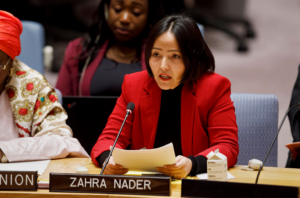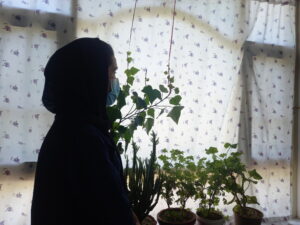Women are deprived from Healthcare by the Ban on Female Students
A report by Selsela Imamzadeh
Maryam Soltani was a medical student at Khatam al-Nabiin University in Ghazni, her hometown when the Taliban came to power in 2021. They announced to suspend education for boys and girls above sixth grade but to restart it in 2022.
They new rulers claimed to need time to carry out a fundamental revision to remove western subjects from textbooks and reflect religious and Islamic teachings in the books. Furthermore, the Taliban believed that girls should wear special clothing and uniforms. Instead of implementing these reforms they announced on December 20th a general ban of women at universities.
There are about 40 public universities in Afghanistan and about 130 private universities. Kabul University was established in 1932, and is the public first institution of higher education in Afghanistan. Maryam Soltani went to the private Khatam-ul-Nabiyin University, which opened it doors in 2006 and has branches in different parts of the country.
The UNICEF data shows that more than three million Afghan girls are not enrolled in school. Also, hundreds of thousands of female students have been denied education since the Taliban came to Afghanistan. Maryam Soltani is one of them.
The presence of female doctors in Afghanistan’s closed, and traditional society is a basic and urgent need. What are the consequences of preventing women from training in medicine, and will the Taliban allow women to be treated by male doctors?

Selsela Imamzada talked with Maryam Soltani about this issues
– Could you provide us with further information about yourself? Who is Maryam and how did she grow up?
I am Maryam Soltani. I’m 20 years old and was born into a middle-class family in Ghazni province. I was a student when the Taliban came to Afghanistan for the second time. I studied medicine in order to treat others, that had been always the career I dreamed of. Now I am a woman, who is locked in the four walls of the house and needs treatment herself.
– Every girl who studied in Afghanistan has both, positive and negative memories, from her school days. Are there any that you have never forgotten?
In 2009, when I was just six years old, the girls in class 12 had been poisoned. Everyone in the school was shocked. My mother at home couldn’t wait until I was back, she saw on the news that numerous schoolgirls had fallen victim to food poisoning. They were lying in every corner of the schoolyard throwing up. I decided that I want to become a doctor. No one found out, who did it. But the aim was to prevent girls to go for education after primary school degree. The closed social atmosphere and insecurity in the country made me finish high school fearing that one day I would be bullied on the way, or poisoned at school, or a victim of explosive attacks due to insecurity.
How did you start studying medicine?
I joined the Faculty of Medicine after graduating with the second highest grades at my High school. I had worked so hard to get this education. After three months of medicine, the Taliban came and we couldn’t go to university for a few months. Until the situation had calmed down, we reentered the universities with the strict requirement of adhering to the full black hijab or burqa and attending classes in a separate from the boys. We were denied the right to speak with the male teachers. I was the sole female student in a class of 50 male students and managed to attain the first place in my academics.
How did you cope with the restrictions? And how did you receive the news that you were excluded as a woman?
Despite the numerous restrictions imposed by the Taliban, I would discretely attend class every day, occupy a corner, and return home after school. However, in December 2022, the Taliban announced a ban on female students. I still went to classes. On January 19th, 2023, the Taliban entered the classroom and took the exam cloths from us. They told us to hurry up and leave the university. We were still hoping for new regulations. But we became more and more disappointed every day.
– What are you doing these days when you can’t go to university or even take educational courses?
My only goal was to become a doctor, and now I am unable to leave the house without a close male relative, a Mahram. At first, it was very hard for me to deal with such a situation. Being away from the community, being out of school, and being out of work has caused a lot of stress and anxiety. I was even considering suicide. I have been going through these difficulties with the support of my family for the past two years. I could attend some online lessons and was able to receive some medical practice in one of the private hospitals secretly. Like any other girl, I have become responsible and busy with household chores, such as cooking, sewing, and cleaning the house.

– How do you feel about the Taliban closing schools and universities? Why do you think the Taliban don’t want girls to be educated?
The decision by the Taliban to close universities, including the Faculty of Medicine, is a huge mistake In our traditional society, it’s not okay for a woman to go to a male doctor. The patient can’t tell the doctor about their pains or other issues. I am still skeptical that the Taliban will allow female patients to go to male doctors for treatment in future. In practice they will deprive female patients from treatment.
– What will happen in the future if the Taliban keep preventing Afghan women to study medicine?
The Taliban want to ensure that we do not have female doctors, and that women do not get sick. This is not in line with nature at all. If this keeps happening, society will become completely dominated by men, and women won’t have any rights. Treatment is a natural and human right, and should not be limited to men and women. The Islamic faith holds that the pursuit of knowledge is a sacred obligation for both male and female Muslims. When it is necessary to cure a sick person, it is necessary for both men and women. In our contemporary society, the well being of the mother holds greater significance than that of the father, as the child is nurtured in the mother’s arms. The mother feeds the child. Therefore, it is an important and fundamental need for female doctors to exist and be trained. At the moment we still have female doctors working. But noone know ho long this will continue. The restriction of education cuts of the supply with new Female medical staff.
– What is your wish for the future?.
My wish is shared by millions of Afghan women and their families. We wish to pursue further studies. We should study in different areas and the Taliban should not stop us from studying and training. There is no law or book that says girls can’t go to school. Let’s have access to our human rights!
A recent Report by Doctors without borders shows the first results of the Ban on Women in public on the Health Care System
A broken health care system, widespread poverty, and increased restrictions placed on women are fueling the current humanitarian crisis in Afghanistan, said Doctors Without Borders/Médecins Sans Frontières (MSF) in February 2023.

These findings are outlined in a new report by the international medical humanitarian organization that makes several recommendations to policymakers, international actors, donors, and local authorities to improve access to health care.They must strengthen primary health care, address the issues contributing to the economic crisis, and ensure access to education and employment for women, said MSF.


